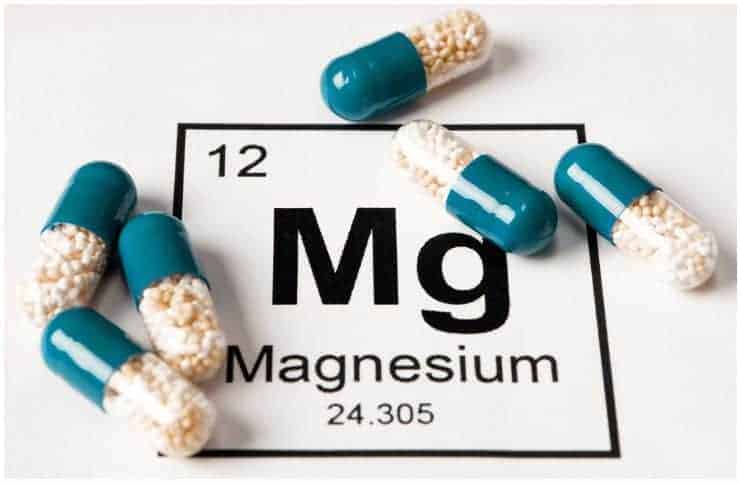Magnesium taurate, also referred to as magnesium ditaurate, is the magnesium salt of taurine and a mineral supplement.
It is a fully reacted complex that is created for the best assimilation and absorption because taurine is used by the human body to transport Mg ions into and out of cells. In addition, this supplement is easier on the stomach than other types of magnesium supplements.
On a pure weight basis, a 125 mg capsule has around 113.75 mg of taurine and approximately 11.25 mg of magnesium.
Signs And Symptoms Of Magnesium Deficiency
Healthy adult women should intake 310 to 320 mg of magnesium daily, and healthy adult men should usually intake 400 to 420 mg per day.
More importantly, pregnant and nursing women need a higher dose, according to the National Institutes of Health’s Office of Dietary Supplements.
However, in the present day, many people in the United States do not obtain the recommended daily intake of this essential mineral in their diets.
Therefore, magnesium deficiency has become widespread (is also one of the most common nutrient deficiencies in the world), largely because of:
- decades of mineral depleting farming practices;
- gastrointestinal conditions such as celiac disease and Crohn’s disease;
- heavy drinking and alcoholism, high rates of prescription medicines and antibiotic use that damages the digestive tract to the point that this mineral cannot be absorbed correctly.
Signs and symptoms of a deficiency include – reduced glucose tolerance, low blood pressure, anxiety, insomnia, migraine attacks, fatigue, loss of appetite, muscle weakness and spasms, and poor nail growth.
Health Benefits
Cardiovascular System
Both magnesium and taurine have the capacity to improve cardiac function.
Taurine is a non-essential amino acid (meaning that the human body can manufacture it) which has a major role in both minerals’ absorption and heart health.
Hence, by helping in the transportation of essential nutrients, such as – potassium, magnesium, and calcium in and out of the heart’s cells, this mineral can actually improve its functioning.
Moreover, this non-essential amino acid protects the heart against damage as well as it helps to make blood flow better to the heart.
Additionally, it is especially beneficial for women because they have a particular requirement for this amino acid as estradiol, a female hormone (important in the regulation of the menstrual female reproductive cycles), and is known to inhibit the synthesis of taurine in the liver.
Lastly, taurine is particularly useful for infants due to the fact that it has a vital role in both brain and eye development, and although adults can produce this amino acid, infants lack that capacity.
Prevention Of Type 2 Diabetes
Sufferers with type 2 diabetes mellitus are more likely than people without being low in this essential mineral because high glycemia increases the loss of magnesium in the urine, which in turn lowers blood levels of magnesium.
Furthermore, according to a recent study of more than 2,000 patients, getting more magnesium in daily nutrition may help protect against this type of diabetes.
Supports Healthy Bones
It plays a major role in the development of healthy bones, and individuals with higher levels of this essential mineral may have a higher bone mineral density.
Therefore, this is important in order to lower the risk of osteoporosis (especially for women over 55) and bone fractures.
Migraines
According to some studies, more than 50 percent of migraine patients and 40 percent of those with cluster headaches are deficient in this mineral.
It is acknowledged that this type of supplements notably lower the severity of migraine attacks and may also help in lowering the frequency of recurrence.
Fights Depression & Anxiety
18.29 percent (about 43.7 million) of adults struggle with some type of mental health problems every year in the United States.
According to a study of over 8,800 individuals, people under 65 years of age with the lowest intake of this mineral had a 22 percent greater risk of depression.
It is believed that a low-magnesium diet modifies the types of bacteria present in the large intestine and promotes anxiety-based behavior.
Cancer Prevention
A higher intake of this essential mineral may lower the risk of some types of cancers. According to a review of a few studies which looked at the association between magnesium intake and colon cancer, a higher magnesium intake (especially from foods) lowers the risk of colon cancer.
Normal Muscle Function
This supplement stabilizes cell membranes as well as it has a calming effect on neuromuscular excitability.
Moreover, it plays a key role in the reactions which generate and use ATP (adenosine triphosphate), the fundamental unit of energy within the human body’s cells.
Sleep
It has become a popular sleep aid since one recent study has found that it helps decrease the stress hormone (cortisol), which can keep you up at night.
Dosage
You may start with a daily dose of 375 mg. Follow this dose for 30 days. If little improvement has been accomplished, you may increase the dose to 500 mg.
Side Effects Of Magnesium Taurate
Diarrhea, Nausea, And Abdominal Cramping
This supplement occasionally may cause diarrhea as well as abdominal cramping or pain, however, most of the time, it is loose stools at higher dosages.
Cardiovascular Effects
Magnesium toxicity might negatively affect the cardiovascular system especially after taking excessive doses of this supplement. Symptoms include – hypotension (a severe drop in blood pressure) and dizziness.
Abnormal Reflexes
Regular use of this nutritional supplement may cause (for some sensitive individuals) abnormally slow reflexes, which may also be accompanied by difficulty moving about normally.
Interactions
This supplement may not be safe for patients who take heart medicines, diuretics, or antibiotics. It is recommended to check with your healthcare specialist if you are taking any prescription medication before using this supplement.
Note
Even when this supplement is taken in regular doses, special warnings and precautions are given to individuals who have kidney failure and kidney disease, since these problems may lead to an inability to eliminate excess magnesium from the body.
Moreover, this supplement may increase the adverse effects of muscle relaxants.
Tip
We usually get most of our minerals and vitamins from the daily diet, and this essential mineral is no different.
Thus, adding foods high in magnesium to your regular diet is a simple method to increase your magnesium levels.
Foods
The best sources of magnesium include:
Pumpkin seeds, wheat bran, almonds, wheat germ, buckwheat, sesame seeds, cashews, pecans, brazil nuts, pine nuts, millet, walnuts, tofu, rye, spinach, soybeans, figs, brown rice, collard greens, turnip greens, prunes, dates, parsley, avocado, barley, beans, garlic, flaxseeds, and dandelion greens.
READ MORE: Canola Oil vs Vegetable Oil
References https://www.ncbi.nlm.nih.gov/pubmed/8692051 https://www.ncbi.nlm.nih.gov/pmc/articles/PMC4586582/ http://www.efsa.europa.eu/947.pdf






What is the regular intake for male? Your article does not mention this.
Around 400 mg per day.
Very informative. Thank you. I just started my prescription today. I do not like taking medication, but my symptoms demands use of magnesium. I am hoping for more benefits, rather than side affects; since i take blood pressure medicine and heart medications like Metoprolol.